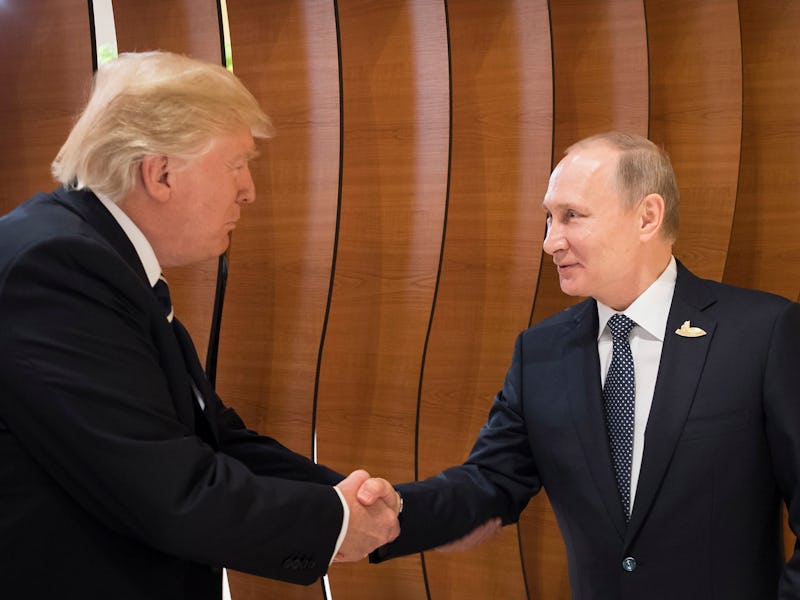Seth Abramson's Viral Tweets Try to Connect the Dots on Trump-Russia
"This is why Trump denies Russian hacking."

Seth Abramson is not without his critics, but the writer — who is also a lawyer and university professor — has written two point-by-point arguments that have gone viral on Twitter, detailing how President Donald Trump and members of his team may be guilty of colluding with Russia and culpable of serious crimes.
Abramson sets up the theory that Donald Trump — as well as members of his team — may be considered “Accessories to Felonies After the Fact” if they were aware of Russian meddling with the 2016 presidential election — and failed to disclose it later — during their meeting with a Russian lawyer reported by the New York Times this past weekend.
“I do think that the top piece of information Americans need is what day was Donald Trump given the information that Russia was hacking,” Abramson tells Inverse.
In a 27-tweet thread (that’s individual tweets have been retweeted over 9,000 times), Abramson parses the details of the reported meeting last summer between Donald Trump Jr., Paul Manafort, and Jared Kushner with a lawyer, who said he wanted to share opposition research about Hillary Clinton.
According to Cornell’s Legal Information Institute, accessory after the fact can be defined as this:
Someone who assists another 1) who has committed a felony, 2) after the person has committed the felony, 3) with knowledge that the person committed the felony, and 4) with the intent to help the person avoid arrest or punishment. An accessory after the fact may be held liable for, inter alia, obstruction of justice.
Abramson makes the case that Trump and his inner political circle would have been on notice that Russia was attempting to influence the election when he started getting security briefings, making the fact that members of his team met with a member of a hostile foreign nation highly dubious.
Critics have said before that Abramson is the master of pulling together different news stories to craft his own factually shaky narratives. He says that’s what actually sets his Twitter feed apart from conspiracy theorists on social media; he says media reports inform his tweet storms, negating the ability for his narratives to be purely speculative.
Still, just because you’re informed by media reports doesn’t mean the correlations you are drawing are correct. Abramson, like anyone else who is not speaking straight to a source or seeing something with their own eyes, has the potential to get things wrong.
In another thread, Abramson sets up how sure he is that President Trump probably knew about the meeting.
There is something very enrapturing about reading through a well-organized tweet thread, as information is given to you in bullet points, 140 characters at a time. Abramson told Inverse on Monday why he chose to use Twitter to share his theory.
“I came to Twitter knowingly and intentionally over time after having tried other methods to get narratives to people in a short period of time,” he says.
And let’s keep in mind that narrative is an important word here. So much of what we know about the Trump administration’s alleged collusion with Russia is the work of piecing together contradictory statements from various officials and an official investigation that’s only part of the way through. In other words, there remains a dearth of cold, hard evidence on the table.
What Abramson does have is a fantastic media reach. With over 160,000 followers on Twitter, he’s earned a large advantage in terms of pushing out the lines he’s drawing between members of the Trump team and Russian involvement. Instead of having one opportunity to tweet out a story he’s written, he can simply tweet the entire story. “It’s really clear from people’s reading habits that they prefer a serialized thread on Twitter to a conventional article on Medium, Huffington Post, or other places I’ve published,” he says.
Abramson says his background in legal writing — he says he was a criminal defense attorney before he started teaching at the University of New Hampshire — made him comfortable writing in short, declarative sentences, so a tweet is in his wheelhouse.
Abramson says it’s in the hands of the media to really prove him right or wrong. He’s convinced that if Trump was officially briefed of a Russian threat, his statements of denial don’t relinquish him from accountability or criminal penalty. From a reasonable standpoint, he had all the information possible to believe otherwise and act accordingly.
It might take more leakers, Abramson says, from the FBI or from the larger government. “Maybe they need to actually ask President Trump directly, and say, ‘Look we don’t really want to know what you believe or don’t, that’s not our question. Our question is: When were you first briefed on it?’”